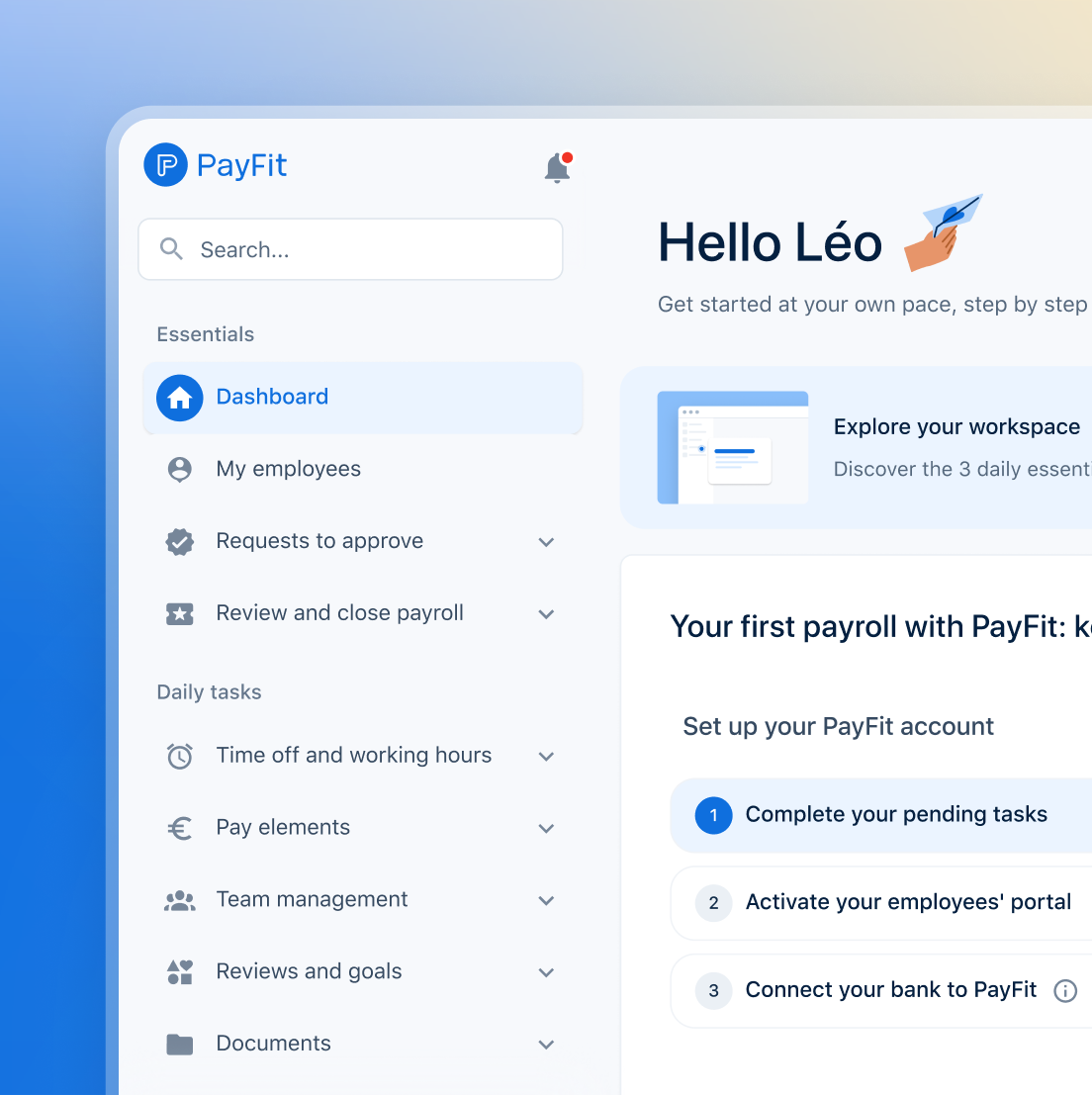✨ Health insurance, now in PayFit - learn more
💷 All the rates & thresholds you need to know for 25/26...right here
✨ The Payroll Journey: Start, Scale & Succeed Globally - learn more
✨ Health insurance, now in PayFit - learn more
💷 All the rates & thresholds you need to know for 25/26...right here
✨ The Payroll Journey: Start, Scale & Succeed Globally - learn more

The year is 2000. The Millennium Dome is open and people are loving it; an incredible three Now albums (45, 46 & 47) have been released, and Bob the Builder's Can We Fix It is the UK's best-selling single.
Simultaneously, accountants are running payroll for the country's many, many SMEs.
In the intervening years, beyond just the 59 new Now albums (yes, we really are at Now 106!) and the revolution in children's TV (Bob the Builder left our screens an entire decade ago), a lot has happened.
However, one thing remains remarkably consistent—accountants running payroll.
This article will explain why accountant-run payroll is not always the best option for businesses and why more modern payroll outsourcing solutions are increasingly popular.
Now, before we go any further, it's important for us to mention that we're not here to disparage or discredit accountants.
Accountancy is a broad term that encompasses many different specialisms. Typically, within most accountancy practices, each area will have its own in-house experts: tax, audit, corporate and forensic.
While some accountants may be able to dabble in each specialism, it's unlikely that they will hold the depth or breadth of knowledge required to be considered specialists in each field.
Payroll is very much a specialism in its own right, governed by its own dedicated bodies, where professionals undergo their own extensive training.
Although some accounting firms may have a dedicated payroll department, it is not always an area where accountants hold a great deal of expertise.
It's a good question and, to be perfectly frank, there's not really one definitive answer. Instead, a combination of factors will usually align for a business to end up using their accountants to run payroll.
For some, accountant-run payroll is just a by-product of their initial set up. For example, it's possible to imagine a situation where a company beginning trading chooses to use their accountant to manage their first few months of payroll.
This is pretty standard and is the way that many businesses initially begin paying their employees. However, as a company scales, its employee count is likely to increase and, by then, it may be – or at least seem to be – too difficult to switch system.
Therefore, to avoid the seemingly unnecessary stress associated with transferring to a different provider, a company may simply choose to stay with their accountant.
Other reasons for choosing accountant-run payroll can be convenience and price. With a significant number of companies already assigning most finance tasks to their accountants, choosing to extend payroll responsibilities to them often seems like the logical solution.
Furthermore, many businesses assume that their accountants are best placed to deal with payroll and don't really separate the responsibilities.
This all stems from a general lack of understanding, knowledge and confidence when it comes to payroll. The perception among companies, particularly larger ones, is that payroll's technical nature would mean absorbing it in-house would require too much work on their part and eat into a lot of their time.
Consequently, they choose to continue their relationship with their accountants because they perceive it to be the 'done thing'.
In many instances, the relationship can work well; however, there can be cases where accountants are not adequately set up to deal with payroll.
Payroll software guide
As we touched on earlier, the longer a system or process exists, the harder it can seem to move away from it. Consequently, switching to a new solution or service is not a decision that businesses will take lightly.
So, what are the main reasons for moving from accountant-run payroll to a specialist payroll outsourcing provider?
Our perception of what constitutes good service has changed significantly over the last two decades. In the early noughties, it is relatively safe to assume that the expectations held were drastically different to those of today.
Back in 2000, we were more accepting of lengthy waits and delayed response times. In 2021, this isn't the case. Instead, we live in a world where instantaneity is not just wanted but demanded.
It is generally accepted that payroll is one of those functions which has not developed as quickly as others. Sadly, a major influencing factor is likely to be due to the people or organisations administrating it on behalf of businesses.
Accountant-run payroll can often continue to be a manual process done through traditional Excel spreadsheets or outdated legacy systems. Ultimately, this can mean that the process itself is clunky with the time taken to finalise often reflecting this.
If an accountancy firm doesn't have a dedicated payroll department, it may be the case that any payroll responsibilities are additional as opposed to primary. For businesses running payroll under these conditions, the experience can be less than satisfactory.
Account management has become a bit of a buzzword, but it has also come to symbolise the proximity between those offering a service and the people receiving it.
Support and nurturing have become part of the expected service when dealing with external providers. This was perhaps best highlighted during the COVID-19 pandemic when payroll legislation was changing on an almost monthly basis. Many businesses relied heavily on their accountants to provide clarity and answers to the changes that were being implemented.
Unfortunately, due to the other responsibilities placed on them, accountancy firms weren't always able to provide the necessary expertise and support required at the time.
Transparency is something that can cover several areas—e.g. process, cost and data. When a business chooses to use accountants to run payroll, they know that they will lose a certain amount of transparency in those areas.
Because accountants often bill on time spent, the cost can become high if the process is long and inefficient. Consequently, many businesses are becoming increasingly keen on having fixed payroll costs either in terms of a retainer fee or based on an employee headcount.
These pricing mechanisms mean that the control and visibility over price can be predicted and managed effectively without receiving any nasty surprises at the end of the month.
Data transparency is another reason why companies are looking to move away from accountant-run payroll.
Generally, when outsourcing payroll to accountants, visibility will be lost over the data and calculations being processed. Under these circumstances, the monthly salary expenditure becomes visible right at the end when payment is due. This can mean that if errors have been made, there is very little time to correct them during that particular payroll run.
With payroll, any number of problems can exist if things aren't done correctly.
The majority of businesses realise this and therefore choose to outsource payroll to accountants with the expectation that everything will be administered correctly. Nevertheless, problems can occur if those performing payroll tasks are not fully qualified to do so.
With payroll legislation constantly changing, the accountant or firm responsible for payroll must be up to date with the latest changes and developments.
While accountants may provide an important service in other areas, if their payroll knowledge is not up to scratch, any errors could leave a company open to fines.
Although companies who outsource their payroll responsibilities don't process the payroll themselves, they remain culpable for any mistakes that occur. Consequently, it's in their interest to ensure that payroll is run both correctly and accurately.
Another area of compliance that is often overlooked is General Data Protection Regulation (GDPR).
GDPR policy can't afford to be ignored and since the new rules entered into force in 2018, businesses have been under added pressure to make sure that their processes meet the requirements.
Unfortunately, many unwittingly leave themselves exposed to breaches by sharing sensitive information with their payroll outsourcing provider via email.
Although often secure, there are certainly better ways for this information to be accessible to outsourced payroll service providers—e.g. through secure portals.
Payroll outsourcing services, however, often don't use systems that incorporate basic security measures and, quite frequently, the information needed to process payroll is often just sent over in the form of a ZIP file via email.
By maintaining old fashioned processes such as this, both businesses and payroll outsourcing firms risk their data being compromised.
For businesses frustrated with their current payroll setup, the good news is that there are alternatives available that can provide a premium service that meets all the regulatory standards.
At PayFit, we consider ourselves to be an in-house software but with all of the benefits commonly associated with payroll outsourcing.
Through our innovative solution, we look to address the complexities of payroll management in a way more befitting of the digital age we're currently living in.
Our goal is to support our clients in administering and running their payroll through a modern-day payroll solution that ensures compliance and saves time and money.
We do so while also assigning each client with their own dedicated account manager and by providing them with access to CIPP-qualified payroll professionals during the onboarding experience and throughout their time with PayFit.
Finally, we also understand that many businesses may be unwilling to break all ties with their accountant.
As we've previously alluded to, accountants play a vital role in a company. Consequently, our app has been designed to allow for different profiles, including an administrator and an accountant.
The administrator role provides the highest level of access and allows the user to define other users’ roles and rights in the administrator area.
The accountant role gives the user access to only documents, reports and information related to a company’s accounting.
Therefore, organisations can now manage their own payroll responsibilities, have visibility over the processes and systems, and allow their accountants to focus on their core functions.
Interested in finding out more about how PayFit can help improve your company's payroll processes? Why not book a demo with one of our product experts?


Compare the best payroll software for UK businesses in 2026. Discover solutions to automate compliance, support growth, & manage employees effectively.

Learn how to run payroll in the UK from how to register for PAYE, calculate tax and NI, send RTI submissions on time, to avoiding HMRC penalties.

Cloud-based payroll software helps UK businesses improve accuracy, reduce errors and maintain HMRC compliance by centralising payroll data and calculations.

We cover the principles of UK payroll accounting, as well as National Insurance rates, 2026/27 tax year compliance & how to streamline your financial reporting.

Essential guide for UK managers on payroll in human resource management, covering National Insurance changes, 2026 regulations, and compliance.

Understand exactly what is net pay, how to calculate it, and the latest UK tax and National Insurance changes for affecting your payroll.

See what's new in PayFit
New features to save you time and give you back control. Watch now to see what's possible